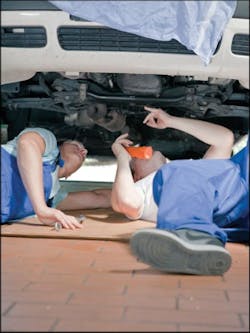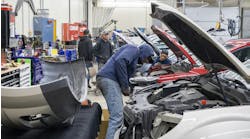The collision industry is changing. More seasoned technicians are leaving the industry or retiring, and a younger generation is coming in to replace them, says Mike Mavec, owner of Mike’s Collision Center Inc. in Bloomington, Ill. But the new guys start out with no tools and little real-world experience. That’s OK, he says, because technicians with a good attitude and strong work ethic can be trained to do the job right.
Mavec discusses the process he uses to advance new technicians from the entry-level workers of today into the journeymen of tomorrow.
I start every new technician at the entry level—most often in the detail department because it’s a fairly basic position. I do that as a way to analyze each person’s ability to follow directions, their self-motivation and personality.
It’s very important to identify your technicians’ personalities up front before investing in them for the long-term. You don’t always necessarily need the best technician right off the bat, as you can train them, but you need the best possible person. I look for good attitudes, a desire to learn and an ability to produce for the company. Everybody in the shop has to get along and communicate as a team. That’s the only way you will advance forward.
Technicians can begin advancing in the shop once they demonstrate consistent positive work habits. Over time, I set them up to work as an apprentice in a certain higher-level position. They work under the wing of another veteran.
The problem is that many new technicians do not have their own tools when they start out. It’s an expensive investment that some just cannot afford. As apprentices, they can only work out of somebody else’s toolbox for so long. So I put together an incentive program for each new technician. I buy them $1,000 worth of tools—basic wrenches, sockets and other hand tools—that are needed to start working on their own. Technicians slowly pay the cost of tools back once they become established and start making solid paychecks. It’s essentially an interest-free loan that allows technicians to launch their careers without incurring personal credit card debt. There is a little catch I put in place to help retain technicians and prevent them from going to another shop. I keep all of their tools if the technician happens to leave the company before paying them off.
I reward technicians with $500 worth of gift cards to our various tool vendors once the tools are paid off, which typically takes about two years. That ensures they will buy more tools that will help further their careers even more. It’s one way to help them get started, and last, in this industry. Tools are a big step in technician advancement. Technicians seem to mature overnight when they have their own tools. They carry a new responsibility on their shoulders.
Of course, building an arsenal of tools is only the beginning of career advancement for technicians. It’s all about constant training from there, regardless of how many years of experience they begin to acquire. I want to support and offer those efforts, so I pay for 100 percent of their training.
I also reward technicians with periodic pay increases for taking additional training. I know that the faster “B” and “C” technicians become “A” technicians, the more positive an impact they will have on the shop. I wanted to ensure that regular training efforts would impact on their salary. That provides opportunity, motivation and positive attitudes for new technicians so they constantly learn and grow with the company.
I don’t have a specific, formal tactic of how I do that. I make the determination on an individual basis, and the amount of raise varies. I factor in their certifications, attitude and new abilities.
It’s important to instill a mindset of constant training when technicians are new. Some seasoned technicians might think they know everything because they’ve been doing it for 20 years. But cars have changed so drastically recently, and simply saying you have several years of experience doesn’t carry as much weight as it used to. What matters is if you can demonstrate a willingness to keep learning.
This long-term process costs the shop money up front, but it’s necessary. It’s about having quality people. When you get somebody at the entry level who has a good personality, find a way to entice him or her to stay in the industry.




